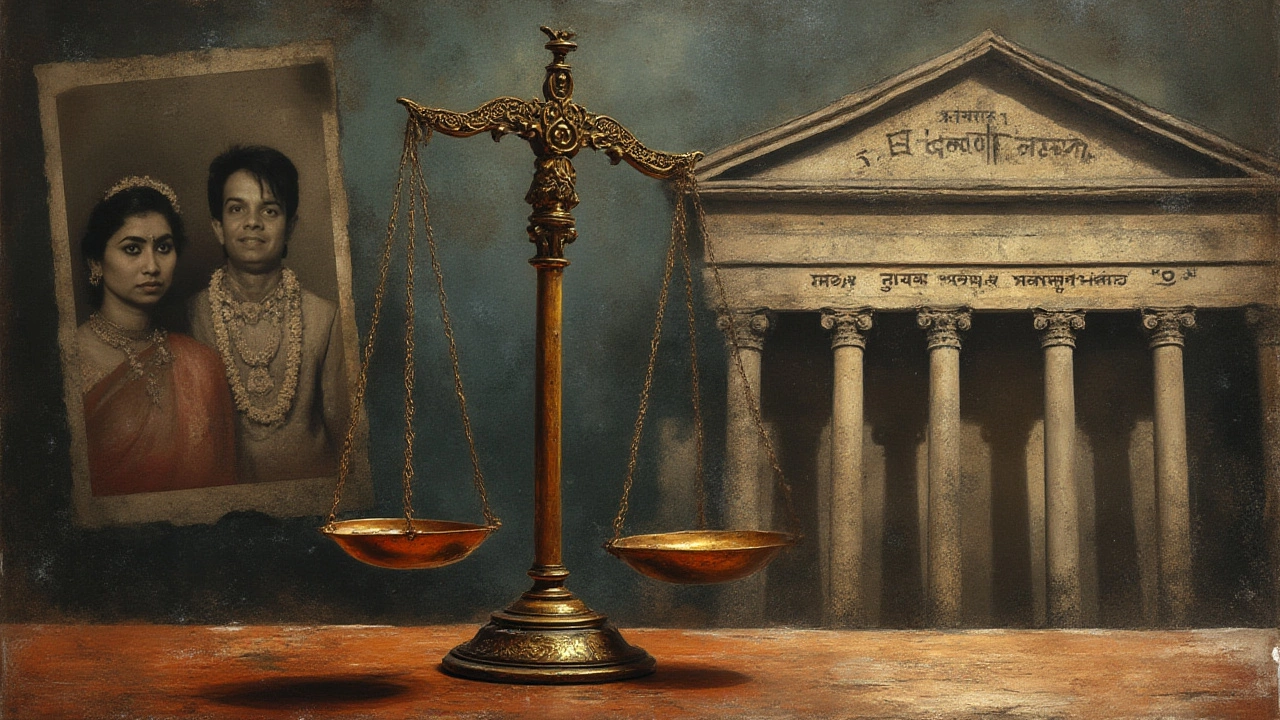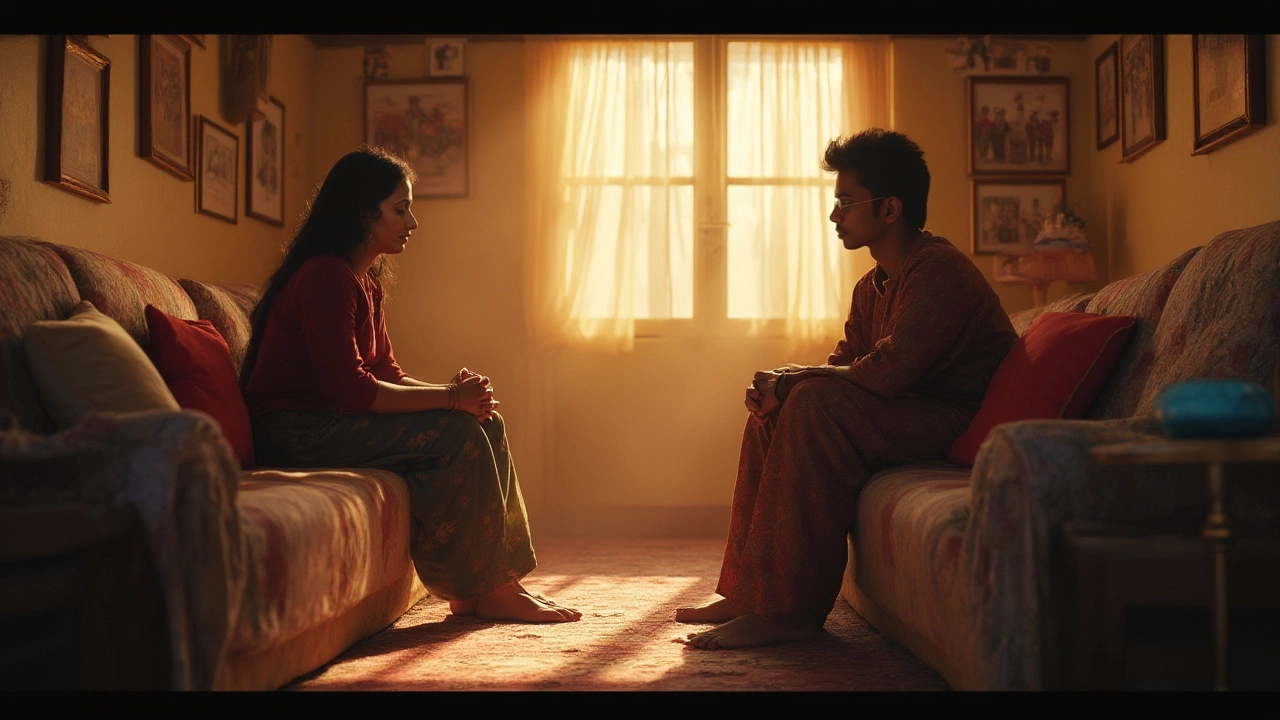Most people imagine newlyweds or long-term couples drifting apart over money, in-laws, or even household chores. Few openly talk about physical intimacy drying up—and what happens when your bedroom has been untouched for months or even years. In India, where sex is barely whispered about in most families, the sudden realization that a marriage has become sexless can spark anger, confusion, and heartbreak. It also raises a brutally direct question: Is no sex grounds for divorce? The answer is surprisingly nuanced, involving centuries-old legal codes, social taboos, and a dash of real courtroom drama.
What Indian Law Says About Sexless Marriages
On paper, Indian marriage laws come across as old-fashioned, but dig deeper and you'll see the courts have actually evolved quite a bit. The main acts—Hindu Marriage Act, Special Marriage Act, and even Christian, Muslim, and Parsi laws—don’t have a checkbox that reads “no sex” as a direct ground for divorce. But case after case has shown that the courts do consider the absence of physical relations a form of “cruelty.” Yeah, you read that right: lack of sex can legally be seen as cruelty in India if it’s intentional and prolonged.
Back in 1970s, the Supreme Court of India started recognizing that depriving a spouse of sexual relations, without good reason, is unfair. Actual judgments quoted phrases like “willful denial of conjugal rights” and “refusal with no medical excuse.” Fast forward to 2023: modern cases have set clear trends. One case from the Bombay High Court (2022) mentions that a spouse asserting the right to sexual relations is looking for love and intimacy—not just sex. The court ruled that a complete denial, especially when one partner desires intimacy, hits the core of marriage.
Let’s clear up a myth, though: the law doesn’t give a free pass for every unhappy couple. If your husband refuses once because he’s tired or unwell, that’s not cruelty. The courts look for a consistent pattern—sometimes even two or three years with zero intimacy or repeated rejection. If your husband just says "not in the mood" for years while rejecting every advance, it gets more serious legally. But if there's a medical or psychological explanation and he’s getting treatment or at least communicating honestly, the court tends to be forgiving.
Numbers tell their own story. According to reports in Indian family courts (2021), roughly 1 in every 11 divorce cases brought up some kind of sexual incompatibility or lack of intimacy. That number’s been going up as people get bolder about what they want from marriage. Yet, most petitioners are still women—reflecting that Indian wives increasingly expect equal say in intimacy and aren’t willing to settle for a "roommate marriage."
If you’re wondering if a simple lack of sex is “enough,” here’s the legal threshold:
- Repeated or total denial of sex—at least several months, but cases with over 1-2 years carry more legal weight.
- No valid reason offered—meaning your husband isn’t sick, working away, or facing proven psychological issues.
- Attempts to discuss, fix, or get help have failed (counseling, therapy, family talks all crash and burn).
Court orders and judgments often call sex “an essential ingredient of marriage” and explicitly say that continued refusal can wreck the marital bond. But remember: each case is different. Judges listen to both sides and have let wives or husbands off the hook if there was honest effort to resolve the issue or unavoidable health complications involved.

Steps to Take If You’re Stuck in a Sexless Marriage
So what do you actually do if your husband has stopped all intimacy, and conversations have gone nowhere? There’s no magic checklist, but knowing the legal and social options helps:
- Document the denial: Courts in India value proof. This doesn’t mean hidden cameras (illegal!) or recording private chats without consent. But you can keep a diary or messages that show you’ve tried discussing sex and have been turned down repeatedly. Don’t fake anything—honesty wins.
- Open, honest communication: Try one more serious conversation, maybe with someone both of you trust as a neutral party. Indian courts want to see that you genuinely tried to fix your marriage on your own before rushing to court.
- Counseling or couple’s therapy: Even if your husband refuses therapy, your willingness to try looks good if you end up in court. Some family courts even make counseling mandatory for couples filing for divorce.
- Medical checkups: If your husband claims health troubles, politely ask for a joint doctor visit. Not to trap him—just so there’s clarity. Unproven “I’m tired” claims don’t impress judges.
- Reach out for legal advice: Whether you talk to a lawyer or use free legal aid clinics (there are many in big cities), get an expert opinion before actually filing anything. They’ll tell you how strong your case is and the paperwork needed.
- Filing for divorce: You’ll generally file under “cruelty” or “irretrievable breakdown of marriage.” You do not have to provide explicit details, but be prepared to answer uncomfortable questions. Family courts are sensitive about privacy, though, and typically hold these proceedings in closed courtrooms.
If you ever worry about retaliation, threats, or harassment after filing for divorce, remember that Indian law protects you. Women can file complaints under Domestic Violence Act if there’s intimidation, and the courts take these seriously.
Check out this data from Indian family courts (2020-2024) on divorce cases mentioning lack of sex:
| Year | Total Divorce Cases | Cases Citing Sexless Marriage | % of Total |
|---|---|---|---|
| 2020 | 40,800 | 2,520 | 6.2% |
| 2021 | 42,600 | 2,937 | 6.9% |
| 2022 | 44,200 | 3,332 | 7.5% |
| 2023 | 46,000 | 3,745 | 8.1% |
| 2024 | 48,700 | 4,183 | 8.6% |
The trend is clear: people are not shy anymore about standing up for their rights within marriage—including the right to intimacy.

Real Indian Cases and Social Reality: What Actually Happens?
Legal theory is one thing, but Indian society often pushes back hard against what it thinks is “private business.” Friends and family still sometimes say, “Why are you making a fuss? Isn't marriage about sacrifice and compromise?” If you’re feeling isolated, you aren’t alone. Study after study, including recent research from Tata Institute of Social Sciences (2023), found almost 31% of married women felt unsatisfied in their marriages due to lack of sexual intimacy—but very few spoke up openly. Now, though, with urbanization and more women being financially independent, taboos break faster and there’s stronger legal support for those who want out.
Let’s look at real cases:
- In 2017, the Delhi High Court granted a wife divorce after her husband refused all sexual contact for three years. The court called his behavior “mental cruelty.”
- Chennai Family Court, 2021: a man filed for divorce, stating his wife never wanted intimacy since marriage. Mediation failed, wife said she had “no interest in sex.” Court allowed the divorce and said sexual incompatibility matters just as much as financial or emotional support in marriage.
- In 2022, a woman from Pune approached the court after her husband consistently avoided intimacy citing “work stress”—for four years straight. The judge ruled that repeated excuses did not count as valid medical grounds. Divorce was granted.
If you’re in a similar spot, practical tips help cut through the anxiety:
- Don’t expect instant results. Court timelines can drag—average divorce case in Indian metros: 2-5 years to full resolution.
- Keep your story consistent. Don’t exaggerate or downplay—truth works best in family courts where judges have seen almost everything.
- Document your side but respect privacy. The court respects discretion—your name won’t be splashed around unless you go to the media.
- If things turn hostile (harassment, defamation, forced reunion attempts), reach out immediately to legal support groups. Don't slog it alone.
- Stay open to reconciliation—sometimes therapy or mediation uncovers issues you didn’t know existed. Judges often ask both parties to try one last honest round of counseling, especially if kids are involved.
If you’re a woman wondering about financial rights: alimony, child custody, and shared property are entirely separate from sexual grounds for divorce. The moment divorce proceedings start, courts look after your economic and parental interests as well.
For quick reference, here’s a breakdown of common court outcomes in Indian no-sex divorce cases (2019–2024):
| Outcome | % of Reported Cases |
|---|---|
| Divorce Granted | 61% |
| Mediation—Reconciliation | 23% |
| Dismissed (No Evidence) | 16% |
The facts prove it: if you’re serious about ending a marriage over lack of intimacy, and you play it straight, you stand a strong chance in today's legal climate. Still, the process can test patience and courage. Half the battle is knowing you're not alone—and that Indian law has quietly updated itself to back your right to a fulfilling marriage. Marriage in India isn’t just a sacrament; it’s a partnership, and when physical intimacy disappears for no good reason, the law doesn’t expect you to keep suffering in silence.
